- Size
- Smallest
- Small
- Small to Medium
- Medium
- Large
- Giant
- Characteristics
- Smartest
- Hypoallergenic
- Fluffy
- Best Guard
- Best Family
- Best for Kids
- Low Shedding
- Healthiest
- Police Dogs
- Most Calm
- Quietest
- Color
- White
- Black
- Grey
- Brown
- Blue
- Red
- Coat
- Hairless
- Short
- Long
- Origin
- Japan
- China
- Australia
- Germany
- Italy
- United States
- France
- Group
- Hound
- Terrier
- Herding
- Toy
- Working
- Sporting
7 Reasons Why Dogs Always Keep Their Mouths Closed

Photo by Matthew Henry on Unsplash
Why is my dog keeping his mouth closed? This is a question that many dog owners may ask themselves when they notice their furry friend holding their mouth shut for extended periods. It can be concerning to see your dog display unusual behaviors, and a closed mouth is no exception. However, there are several possible reasons as to why your dog might be keeping their mouth closed that range from harmless to serious.
In this article, we'll explore some of the potential reasons why your dog might be keeping their mouth closed, what you can do about it, and when it's time to consult with a veterinarian.
Normal Closed-Mouth Behavior
Before delving into potential reasons for a dog keeping its mouth closed, it's essential to acknowledge that closed-mouth behavior is a normal part of a dog's repertoire. Dogs close their mouths for various reasons, such as relaxation, concentration, or even contentment. In some instances, dogs may keep their mouths closed simply due to their individual preferences or as part of their natural behavior.
Abnormal Closed-Mouth Behavior
Here are 7 abnormal reasons why dogs keep their mouths closed:
1. Emotional Distress
Dogs are emotionally sensitive beings, and changes in behavior can often be linked to their emotional well-being. Emotional distress or anxiety can manifest in various ways, and one of them is a closed-mouth posture. Dogs may close their mouths when feeling stressed, fearful, or uncomfortable in a particular environment or situation.
Changes in the household, new additions (human or animal), or exposure to unfamiliar stimuli can trigger emotional distress in dogs. Observing accompanying body language, such as flattened ears, tucked tail, or avoidance behaviors, can provide insights into the emotional state of the dog.
2. Fear or Aggression
Closed-mouth behavior in dogs can also be indicative of fear or aggression. While these are contrasting emotions, both may cause a dog to adopt a closed-mouth posture as a defensive or threatening response. Fearful dogs may close their mouths to avoid confrontation or to signal submission, while aggressive dogs may do so as a precursor to aggressive behavior.
Understanding the context in which the closed-mouth behavior occurs is crucial in distinguishing between fear and aggression. Fearful dogs may exhibit other signs of anxiety, while aggressive dogs may display tense body language, raised hackles, or growling.
3. Training or Past Experiences
A dog's training and past experiences can influence its behavior, including mouth-related behaviors. Some dogs may have been trained to keep their mouths closed in specific situations, while others may have learned to associate opening their mouths with negative experiences.
Traumatic incidents, such as rough handling during oral examinations or aggressive behavior from other animals, can create lasting associations. In such cases, positive reinforcement training and gradual desensitization can help reshape the dog's perception and behavior.
4. Dental Problems
Dental problems are one of the most common reasons why dogs keep their mouths closed. Dogs are susceptible to many of the same dental issues as humans, including gum disease, cracked teeth, tooth decay, and abscesses.
When dogs experience dental problems, they may keep their mouths closed to avoid causing themselves pain. They may also drool excessively, paw at their mouths, develop bad breath, or avoid eating or drinking to avoid irritating their gums or teeth.
To avoid dental problems and assess your dog's dental health, it's essential to take them for annual checkups with a veterinarian and to brush their teeth regularly.
5. Pain
Closed mouths can also be a sign of pain. Dogs are intelligent creatures that will avoid movements or positions that cause discomfort. Holding their mouths closed may be their way of relieving pain, perhaps due to an injury or illness.
If your dog is keeping their mouth closed and displays signs of discomfort, such as whimpering, bloated stomach, or changes in appetite, it's crucial to contact your veterinarian immediately.
6. Stress and Anxiety
Dogs can experience stress and anxiety just like humans. When dogs are in stressful situations, such as during thunderstorms, fireworks, car rides, or visits to the vet, they may keep their mouths closed as a way of coping with their fear.
Some other signs of stress in dogs include trembling, hiding, panting, drooling, cowering, and pacing.
To help your dog deal with stress and anxiety, you can use natural remedies such as CBD oil, calming scents, or pheromones. It may also be helpful to create a safe space for your dog where they can retreat and feel comfortable during these events.
7. Respiratory Issues
Respiratory issues can also cause dogs to keep their mouths closed. These issues can range from allergies, asthma, or snoring, and some can be serious, such as brachycephalic syndrome (more commonly seen in breeds such as bulldogs, pugs, and Boston terriers).
Dogs with respiratory issues may also display characteristics such as wheezing, coughing, or having a blue tongue (cyanosis), which is a sign the dog is not getting enough oxygen.
As with other medical issues, when you suspect your dog is having respiratory problems, it's essential to visit a veterinarian right away for a proper diagnosis and treatment.
When to Visit the Vet
If your dog is keeping their mouth closed and displays other symptoms such as excessive drooling, lethargy, lack of appetite, or vomiting, it's crucial to take them to a veterinarian immediately. Some of the possible medical conditions that can cause these symptoms include leptospirosis, parvovirus, kidney failure, and pancreatitis.
In addition, if your dog is exhibiting fearful or aggressive behavior, it's essential to seek immediate guidance from a professional dog trainer or veterinarian.
Final Thoughts
The behavior of keeping the mouth closed in dogs is a nuanced aspect of their communication that requires careful observation and consideration. From physical discomfort to emotional distress, the reasons behind closed-mouth behavior are diverse. As responsible pet owners, staying attuned to our dogs' overall well-being, seeking veterinary attention when needed, and employing positive reinforcement techniques contribute to fostering a healthy and communicative relationship with our canine companions.
You May Also Like
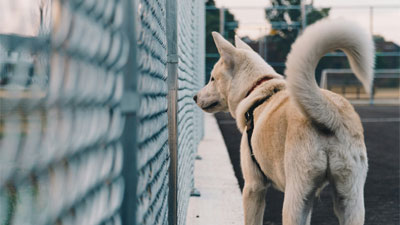 Dog BehaviorWhat Do The Different Dog Tail Positions Mean?
Dog BehaviorWhat Do The Different Dog Tail Positions Mean?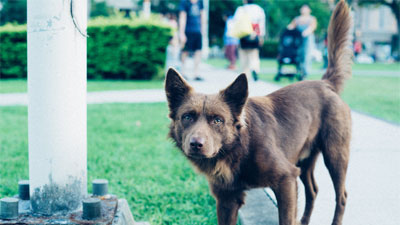 Dog BehaviorHow Do Dogs Show Their Emotions?
Dog BehaviorHow Do Dogs Show Their Emotions?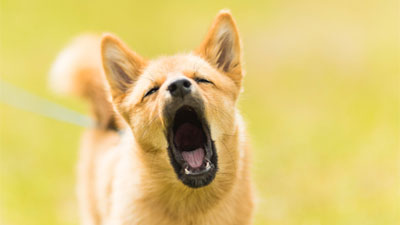 Dog BehaviorThe 6 Common Dog Sounds and Their Meanings
Dog BehaviorThe 6 Common Dog Sounds and Their Meanings Help & AdviceWhat Is The Hardest Dog Trick?
Help & AdviceWhat Is The Hardest Dog Trick?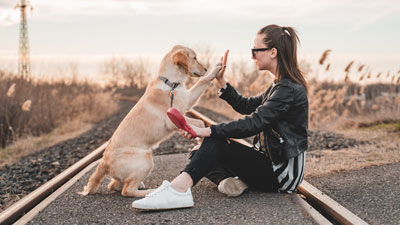 Dog Training TipsHere are the 7 Most Important Dog Commands
Dog Training TipsHere are the 7 Most Important Dog Commands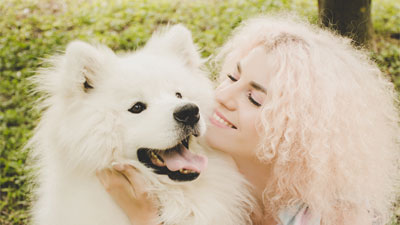 Dog Training Tips5 Easy Steps: How to Teach a Dog to Smile
Dog Training Tips5 Easy Steps: How to Teach a Dog to Smile